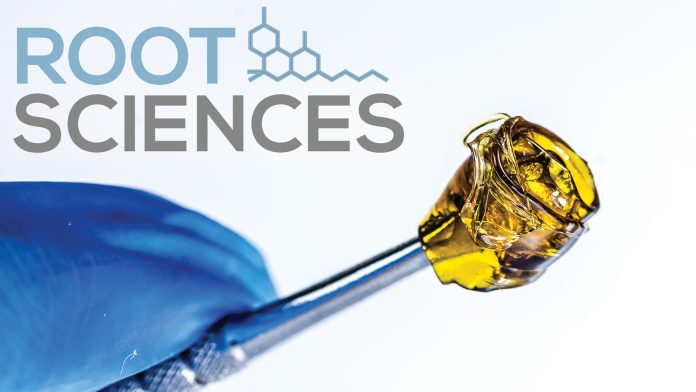
As the demand for cannabis distillation increases, discover how Root Sciences provides scalable solutions.
What exactly is THC or CBD distillate and how is it created? The process is actually not as complex as most people would think. It’s comparable to ‘distilled’ water, which is just water that has undergone a series of changes, more commonly known as purification. Water is evaporated into a gaseous state and then chilled back into liquid, thus providing a more refined product. Cannabis distillation is quite similar.
To get to distillate, one must go through a series of changes. This begins with the extraction process and then is carried into the distillation process.
Modern extraction and distillation methods, like those provided by Root Sciences, have turned traditional distillation practices (like water purification) into a sophisticated post-extraction purification process.
Distillation is ‘the action of purifying a liquid by a process of heating and cooling.’ –
Oxford Dictionaries.
Many different cannabis extracts are currently available in today’s market. However, the one that continues to gain the most attention is cannabis distillate. Although the term ‘distillate,’ itself, is not new, the term “cannabis distillate” has recently surged in popularity within today’s flourishing hemp and cannabis markets.
First step: extraction
Different forms of extraction methods used to concentrate and target molecules from plants have been around for centuries. Cannabis extraction processes have adapted different techniques popularly used in today’s agriculture, biopharma and petrochemical industries.
Prior to the distillation phase in processing, the three most commonly used extraction methods used in the creation of cannabis crude oil are: CO2, light hydrocarbon and ethanol. Each of these methods have their own set of pros and cons, as outlined in detail below.
CO2 extraction
CO2 extraction is a method combining carbon dioxide and extremely high-pressure to extract the desired molecules from plant matter.
CO2 extraction technology does come with a few benefits. First, CO2 extraction is widely considered a natural extraction method, as CO2 is a naturally occurring compound.
Additionally, in comparison to other numerous solvents used in extraction, CO2 is among the safest for industrial extractions. Manufacturers consider CO2 a much safer choice in a commercial setting, compared to other hydrocarbons such as butane or propane.
CO2 extraction does come with a few cons. The most relevant disadvantages of CO2 extraction include the substantial upfront cost involved in the purchasing of the equipment, low yield, longer run times, and most importantly, its ability to scale up in a commercial setting.
Hydrocarbon extraction
Hydrocarbon extraction is a method that uses a solvent, such as butane or propane, washed over the plant matter, to ultimately concentrate a targeted, desired molecule and remove it from the biomass.
Why is this method so popular? Hydrocarbon extraction has become popular due to its efficiency in the areas where CO2 falls short. It boasts a higher yield rate, preserves different terpenes than other methods and equipment is more affordable.
Overall, this method of extraction is preferable, but also comes with its own set of drawbacks. Chemicals like butane are volatile gases and obviously have a high potential for combustion and flammability, resulting in zoning and storage limitation laws put in place for safety purposes. Consequently, this creates limitations on scalability for operations looking to expand. If a manufacturer is looking to scale, hydrocarbon extraction is not advised.
Cryo-Ethanol extraction
Cryo-Ethanol extraction is the method Root Sciences has helped pioneer after years of diligent research and prototyping. Root Sciences has effectively isolated cryo-ethanol to be the most appropriate method of primary plant matter extraction.
So why is cryo-ethanol the preferred method by Root Sciences? The answer is simple – scalability.
Root Sciences, now in partnership with German manufacturer, DEVEX, is utilising cryo-ethanol extraction to lead the commercial scale extraction market in their latest product launch, CRYOExS. Root Sciences and DEVEX, together, are paving the way for cryo-ethanol as a sustainable solution for the pre-distillation of crude cannabis oil.
The real advantage to this method is its ability to effectively scale up within manufacturing operations. It is broadly acknowledged as the most commercially usable method in both small and large scaled production.
While CO2 and hydrocarbon extraction methods both produce acceptable results in the creation of cannabis concentrates, the post-processing and filtration requirements during the dewaxing or winterisation processes create issues for commercial producers when attempting to scale their operations up.
Winterisation uses ethanol and sub-zero temperatures to separate unwanted fats and waxes from the oil. This method is ideal because it preserves yield rates. Unfortunately, ethanol has a higher purge temperature, so terpene retention can suffer without proper care.
De-waxing during a light hydrocarbon extraction is possible and is commonly referred to as ‘single solvent’ dewaxing. This involves performing the butane or propane extraction under extremely low temperatures to make the lipids insoluble. This is satisfactory for standard concentrates found in the consumer market (i.e. dabs). However, when demand for ultra-high purity needs to be met, the single solvent de-wax method falls short due to lipids making their way into the extract. Ultimately, a secondary solvent dewax will need to be performed in order to remove any stray lipids that made their way into the oil during extraction.
Secondary solvent dewaxing is a process that utilises ethanol as the solvent, winterisation time, and a filtering process. This adds a bottleneck to the operation, as additional processing days will be added.
Root Sciences/DEVEX cryo-ethanol extraction process provides the benefit of bypassing several steps; the CRYOExS efficiently leaves all lipids behind during the extraction process, which allows processors to cut the above-mentioned bottleneck down from a few days to just a few hours.
When looking at starting a THC distillation operation, one should consider each of the three extraction methods as part of their overall operation. All three are proven to work in the pre-distillation stage. However, when considering industrial hemp extraction and purification, cryo-ethanol extraction proves to be a better business decision than the CO2 or the hydrocarbon extraction method.
It’s this simple: Think about your own growth and scalability when choosing the best pre-distillation extraction method.
Next step: distillation
Now that you know what pre-distillation (commonly known as extraction) entails, the formula for THC and CBD distillation is relatively simple.
After all of the undesired materials are removed with Root Sciences’ proprietary processes, what is left is the purest form of distillate possible with some levels even reaching up to and above 99% cannabinoid content. It is safe to say that CBD and THC distillates have become the cleanest and most potent cannabis concentrates you can buy on the market today.
In their partnership with German manufacturer, VTA, Root Sciences’ method of short-path wiped film distillation quickly and efficiently refines cannabis crude oil into a more versatile form, commonly referred to as CBD or THC distillate.
The distillation process involves ultra-high vacuum, heating or cooling molecules, and other differentiating steps between equipment manufacturers.
So, the real question now becomes, which manufacturer is doing it best?
Introduction to Root Sciences
Root Sciences has developed a product line that encompasses all required processes mentioned above to produce the highest quality distillate in the most efficient manner.
Root Sciences, in their partnership with VTA, is one of the few major manufacturers of hemp and cannabis distillation equipment on the market today. Beginning as practitioners themselves, with a strong focus on quality engineered short-path wiped film distillation equipment for the hemp and cannabis industry, Root Sciences has contributed years of hands-on research and development; perfecting processing equipment and SOPs, so clients have access to the kind of expertise and support they deserve.
Among competitors in the market, Root Sciences’ line of VTA products most advantageously separate three main post-extract constituents: cannabinoids, volatiles (such as terpenoids and flavonoids) and non-volatiles, in addition to other undesirable by-products.
Backed by quantifiable purity and potency results, Root Sciences’ short-path distillation System consistently produces the top-quality distillate that today’s consumers have come to expect.
Root Sciences is a global industry leader, representing the latest, most trusted distillation technology in the hemp and cannabis industry. Root Sciences works closely with licensed producers and processing partners across the globe who provide the experience and expertise necessary to isolate active cannabinoids and therapeutic terpenes for healing and wellness. Root Sciences’ clients achieve test results as high as 99.85% total cannabinoids with the use of their line of distillation equipment.
Root Sciences’ European partners
Root Sciences has established an exclusive distribution agreement with two German global industry leading processing companies, industrial-scale ethanol extraction manufacturer DEVEX and short-path distillation industrial equipment manufacturer VTA.
DEVEX is known for the design and manufacturing of industrial size ethanol extraction technology, capable of handling the largest scale ethanol extraction plants. They are a manufacturer that offers decades of industrial production experience. Root Sciences can provide tried and tested large scale processing for the Hemp industry worldwide. Designed in collaboration with DEVEX, the CryoExS (Cryo Ethanol Extraction System) is capable of extracting anywhere from 400 lbs. (small plant) to 4000 lbs., for a larger plant, per eight-hour shift.
VTA is an acronym for Verfahrenstechnische Anlagen, which is German for ‘process engineering plants.’ Short-path, molecular distillation is a special type of distillation technology that allows for even lower working temperatures than other comparable systems. VTA’s Short-path wiped film technology is very similar to standard short-path distillation; the main difference being the technology behind its configuration. VTA’s proprietary wiper system more precisely agitates and pushes crude oil down the evaporation chamber. This ensures a consistent separation of desirables from undesirables.
Thanks to short residence time, lower temperatures and immediate cooling; thermal stress and decomposition can be minimised.
VTA specialises in the field of thermal process engineering. The main focus of production is thin film and short-path distillation plants at laboratory, pilot and industrial scale. These highly qualified and responsible professionals ensure the highest quality standards. The manufacturing of the main components is done at the VTA site in Niederwinkling, Germany, allowing quality control to be overseen every step of the way to produce the most up to date industry-leading technology.
It is clear why Root Sciences has partnered with both of the European manufacturers mentioned in this article. It’s all about their reputation, their proven technology track-record, and most of all, their ability to scale in a commercial setting.
Root Sciences scaled approach
So, what’s the right system for your operation?
Most businesses are focused on either scaling-up for mass-market innovation or scaling-down to meet specific and more localised business needs.
Which is more important for you to focus on in order to advance your own commercial processing in cannabis distillation? Unfortunately, the one size fits all approach doesn’t work; the industry today requires both.
Root Sciences is committed to meeting and balancing the needs of any processor, from new small operations to large-scale industrial hemp and cannabis processors. Our relationship with clients of all sizes, from every corner of the globe, favourably places the brand amongst top manufacturers leading today’s emergent cannabis distillation market.
VTA offers four standardised models intended on meeting the needs of varying operation sizes:
VKL 70-5 RS
The opening model in our VTA line, the VKL 70-5 RS is the perfect industrial starter distillation centre. If you don’t know what machine you need, the first metric you should consider is the amount of material you want to process per shift. The VKL takes the crude oil produced from 180 kg per shift and yields four to five litres of distillate.
VKS 70-5 RS
The VKS 70-5 is the next step up from the VKL 70-5. While it operates on the same electrical single phase set up, the VKS has the ability to run three times more material than the VKL per shift. It takes 544 kg of biomass and yields 12 to 13 litres of distillate. Both of these models are well suited to small and medium operations that are space conscious and don’t need the additional processing power that the following two models offer.
VK 100-10
Stepping up into serious distillation needs, the VK 100-10 can process 2,041 kg per shift and yields 25 to 30 litres. This machine is best suited for processors who need large production. The VK 100 is a bit larger than its smaller counterparts. Be sure to note the space requirement and differing electrical supply that this machine requires when planning a distillation space.
VK 200-40
At the top of Root Sciences’ standardised line, the VK 200-40 boasts the ability to process 11,339 kg. of cannabis per shift; this produces 320 to 400 litres of distillate. This model is for processors who require extra-large production. Be sure to note the space requirement and differing electrical supply that this machine requires when planning a distillation space.
Q & A with Cory Balma, Sr. Technical Director at Root Sciences
What types of extract can the VKL process?
The VKL processes sulphate-free, pre-processed cannabis oils derived from CO2 (Carbon Dioxide), BHO (Butane Hash Oil) or Cold Ethanol (-40˚C to -60˚C or lower) that have been fully winterised, decarboxylated and devolatised.
What exactly does the VKL system do?
In essence, our VKL system quickly and efficiently distils a highly purified, cannabinoid-rich fraction.
Are the recovered terpenes usable?
When speaking about terpenes that result from a first pass distillation, one needs to understand that the particular set of terpenes coming out of the machine are mainly heavy end terpenes like Beta Caryophyllene Oxide and Humulene. Both of these terpenes have beneficial properties.
If desired, the terpenes can be utilised in a multitude of products. For example, they can be used in vapour cartridges to reduce viscosity naturally, while also modulating the end user experience.
What yield will I see from the VKL?
Individual yields are highly dependent on the material used. However, the VKL system can capture up to 99% of available cannabinoids, and typical yields range from 80-85% by weight.
What potency can I expect from the VKL?
Potency is dependent upon the quality of biomass used but can exceed 99% total cannabinoid. Typical ranges are in the mid to high-90’s.
The clear choice: Root Sciences
As global distributors of the VTA Short-Path Distillation Plant VKL 70-5 & DEVEX cryo-ethanol Extraction System CryoEXS 400, Root Sciences ensures that new customers are properly setup, trained and ready to make high-quality clear distillate on day one.
The Root Sciences team have been leaders in extraction and distillation for over a decade, acquiring the expertise to train technicians and more importantly, support clients with the everyday questions that will inevitably arise. This differs from competitors coming from a manufacturing background, as they will not have the experience with extraction, winterisation or solvent recovery processes that a burgeoning business needs.
Root Sciences is an industry leader with first-hand knowledge of scalability. Their extraction and distillation systems are some of the most technically advanced processing products available due to this fact: the client’s biggest advantage comes from Root Sciences’ years of first-hand experience, service, and line of scalable equipment. Root Sciences brings proven, scalable equipment, technological advances and years of acquired knowledge to any commercial processor, no matter the size of their operation.
For cannabis businesses with the intention of scaling operations, seek out the experts: Root Sciences.
Want to know more about Root Sciences and the products they offer? Contact Root Sciences directly for more information at www.rootsciences.com.
Root Sciences
+1 (206) 452 1130
info@rootsciences.com
www.rootsciences.com
Please note, this article will appear in issue 10 of Health Europa Quarterly, which will be available to read in July 2019.









